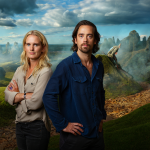
Is Religion Dying: Singularity is just around the corner
Updated Aug 2023
According to experts, computers are projected to surpass human intelligence within 25 years or even sooner. The law of survival dictates that only the most adaptable will thrive. To ensure humanity’s survival, individuals may need to undergo enhancements like memory upgrades, increased neuron count, and improved neuron connectivity.
“Within thirty years, we will have the technological means to create superhuman intelligence,” he wrote. “Shortly after the human era will be ended,” Vinge claims that singularity will be as dramatic a change to the planet as the rise of humanity once was, and that these changes will happen at a rate with which humanity will struggle to cope.
“From the human point of view this change will be a throwing away of all the previous rules, perhaps in the blink of an eye, an exponential runaway beyond any hope of control. Developments that before were thought might only happen in ‘a million years’ (if ever) will likely happen in the next century,” Vinge wrote.
Is Religion Dying Because Human life extension is near
In September 2013, Google unveiled Calico, short for the California Life Company, with a mission to decode the biological mechanisms governing lifespan and “develop interventions that promote extended and healthier living.” While much remains undisclosed about this new biotech venture, it appears to be oriented towards advancing age-reversing medications.
In April 2014, it enlisted Cynthia Kenyon, a renowned scientist recognized for her achievements in genetically modifying roundworms to live up to six times longer than usual. She has expressed her aspirations to apply these findings to humans. Tom Johnson, a prior trailblazer in the field now at the University of Colorado, who initially identified a genetic influence on longevity in worms, notes, “Calico possesses the resources to pursue nearly any endeavour it desires.”. Full Story
PayPal co-founder Peter Thiel created Breakout Labs.
Allocating funds to scientists and startups, some focused on achieving immortality; he invested $3.5 million in the Methuselah Foundation. Co-founded by Aubrey de Grey, a biomedical gerontologist, the foundation’s Strategies of Engineered Negligible Senescence (SENS) treats ageing as an engineering puzzle, aiming to halt cellular ageing by reprogramming cells. An unwavering advocate, de Grey firmly believes our generation could be the first to attain immortality or, at the very least, extended lifespans.
If you’ve watched any ageing-related TV show or documentary, you’ve likely encountered the unmistakable Aubrey de Grey. He’s a distinctive figure with his waist-length ponytail, Methuselah-like beard, and deep British accent. I’ve had the chance to meet Aubrey and share a beer or two with him (if de Grey’s world has a fountain of youth, it flows with beer). As he leaned in to chat, he discussed the latest strategies against the inevitability of ageing. . Full Story
Exploring the Correlation Between Belief in God and Intelligence
University of Ulster Professor Richard Lynn will present his findings in upcoming research set to be published in the journal “Intelligence,” as the Times Higher Education Supplement reports.
Lynn and his two co-authors propose that average IQ is a robust predictor of the percentage of the population that holds religious beliefs, spanning 137 countries. They reference surveys conducted by the US Academy of Sciences and the UK Royal Academy, revealing low rates of religious belief among academics.
It’s not particularly startling that professional sceptics often reject the idea of a creator. Lynn, however, contends that the higher intelligence of academics directly leads to their tendency to not engage with religious matters. He explains, “Why do fewer academics believe in God than the general population? I think it’s simply a matter of IQ. Academics possess higher IQs than the general populace.”
Dr David Hardman from London Metropolitan University says, “Establishing a causal relationship between IQ and religious belief through true experiments is challenging. Nevertheless, evidence from other spheres suggests that heightened intelligence is linked to an increased capacity—or perhaps willingness—to question and challenge deeply ingrained intuitions.” Full Story
Christianity’s Diverse Advantages: Enriching Lives and Communities
Merely centering on the inquiry “Is religion dying?” is inadequate; we must also delve into the other dimensions of the debate. This is crucial for gaining a comprehensive understanding of the matter at hand. Let’s now delve into the positive aspects of religion.
Christianity, among the world’s major religions, bestows numerous advantages on its followers. These benefits extend beyond spirituality and positively impact individuals, communities, and society.
Foremost, Christianity instills purpose and meaning in believers’ lives. It provides a moral framework and guiding values. This purpose offers solace and optimism, especially in challenges. Christianity promotes love, forgiveness, empathy, and the kind treatment of others.
Additionally, Christianity spurs personal growth and self-improvement. Seeking wisdom and understanding through prayer, meditation, and studying texts leads to personal transformation, self-awareness, and purpose.
Moreover, Christianity cultivates strong communities. Churches unite to worship, support, and share experiences, reducing isolation.
Positive Impacts of Christianity: Altruism, Hope, and Community
Christianity also encourages altruism and assistance. Christians nurture affection for neighbours, aiding the less fortunate. This promotes charitable institutions, hospitals, and schools, benefiting society. Volunteerism and humanitarian work are common, enhancing communities.
Lastly, Christianity offers hope and eternal life belief. Assurance of salvation brings comfort and resilience in hardships. This hope grants tranquillity, aiding in facing life’s challenges.
In conclusion, Christianity imparts various benefits: purpose, growth, community, service, and hope. This elevates well-being, influencing lives worldwide.
The Vast Overlooked Perspective: Singularity and the Potential End of Religion
An enormous revelation that eludes almost everyone—by everyone, we mean 99% of the populace—is the possibility that singularity might herald the conclusion of religion. A subtle trend is underway, poised to gain momentum in the forthcoming years; this trend is aptly termed the “end of religion.”
Within laboratories, treatments capable of extending life and curing numerous ailments already exist, albeit deliberately restrained. As the awareness spreads that mortality can be challenged, individuals will gradually but inevitably distance themselves from religious beliefs. A significant portion of contemporary Catholics and Christians merely identify as such in name; their religious perspectives shift with the expansion of personal freedoms and the promise of improved earnings.
We want to stress that our aim is not to cause offence; we’re simply exploring emerging trends, which is why we also addressed the positive aspects of religion.
Conclusion: Is Religion Dying Amidst Shifting Perspectives?
In the realm of evolving possibilities, the question “Is religion dying?” resonates. However, this is just one facet that warrants examination amidst a broader narrative. To grasp the full panorama, it’s crucial to explore varied dimensions.
From the imminent horizon, singularity looms, an uncharted territory where technology might intersect with belief. Though unnoticed by most, this revelation could spell the culmination of religion—a trend dubbed the “end of religion.”
The potential to extend life and conquer illnesses is within reach yet deliberately constrained in laboratories. As the realization dawns that mortality isn’t absolute, a natural drift from religious affiliations is likely. In contemporary times, many Catholics and Christians merely retain their label as personal freedom expands and prospects improve.
Emphasizing that our intention isn’t offence, we venture into these emerging trends while acknowledging religion’s affirmative influences.
In the tapestry of change, the interplay between belief and science beckons, posing, “Is religion dying?” But to truly fathom this enigma, we must broaden our lens and delve into the multifaceted landscape surrounding it.
The concept of singularity, often unnoticed, can reshape our perceptions, potentially leading to the “end of religion.” This subtle yet potent trend gains momentum, offering a fresh perspective.
Behind laboratory doors, life-extension technologies and remedies for ailments await, intentionally restrained. As the curtain rises on the possibility of defying mortality, a gradual shift away from religious tenets takes root. Contemporary identifiers like Catholics and Christians, in name alone, adapt as freedom expands and prosperity beckons.
Let it be known that our exploration isn’t aimed at provocation; we tread through these emerging currents while acknowledging the positive undercurrents of religious influence.
The query “Is religion dying?” echoes in the ever-evolving narrative, seeking answers. Yet, this inquiry is just a fragment of a larger mosaic. We must venture beyond and unravel the intricate tapestry of perspectives to gain genuine insight.
Emerging on the horizon is the prospect of singularity—an overlooked revelation that could potentially redefine the role of religion, aptly dubbed the “end of religion.” Subtle as it may be, this trend gathers momentum, presenting a fresh angle for contemplation.
Within the confines of laboratories lie transformative technologies that could extend life and conquer ailments, deliberately restrained. As the boundaries of mortality blur, a natural drift from religious affiliations unfolds. Though labelled, contemporary identifiers such as Catholics and Christians adapt their perspectives in the face of expanding freedom and prosperity.
We stress that our purpose is not to incite, but to explore these emerging currents while acknowledging the constructive aspects of religion.
Other Stories of Interest
The American dream is nothing but the American Nightmare
Why Contrarian Stock Market Investors nearly always lose
Fear equates to Stock Market Buying Opportunity (Feb 25)
Great books on life and Investing: Short, sweet & simple (Feb 25)
Worldwide IQ scores dropping but Stupidity rising rapidly ( Feb 10)












